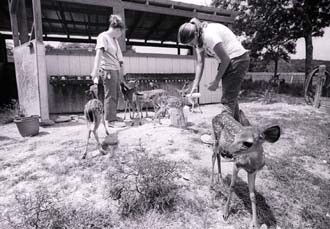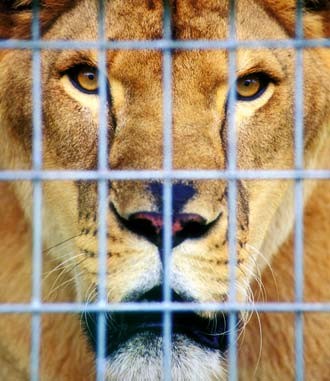|
One neighbor raises a fuss over Kendalia wildlife sanctuary If you live in Kendall County, you should know that there are herpes-infected monkeys who will sit on your back deck and watch the evening news through your bay window. Howling coyotes will stalk your precious, furry little shitzu dog when it goes outside to potty. And a ravenous Asian-African hybrid lion will leap over a tall fence in a single bound and devour you as you nap in your backyard hammock. Yes, there's trouble in the Peaceable Kingdom. People who move to the Hill Country inevitably suffer the trauma that animals actually live in the woods. There are deer, birds, rabbits, skunks, opossums, raccoons, snakes, lizards, and assorted insects, and they want to get into your house and eat your family. Lions, and tigers and bears? Oh, my, yes, there are, dear neighbor (well, there aren't any tigers). But they're not running wild. They're locked up in secure enclosures at Wildlife Rescue and Rehabilitation, located on 187 acres in Kendalia, near the Little Blanco River. The operation is run by former San Antonio resident Lynn Cuny, who has turned a lifelong love of animals into a renowned wildlife rescue and rehabilitation center. It has a veterinary clinic, a large staff, several interns, and volunteers who care for more than 7,000 animals each year. This is not a zoo. The public is not allowed into the section of the property that is dotted with numerous heavy-gauge, electrified fences and, in the case of the primates, heavy mesh. Trees are kept well trimmed to prevent animals from escaping off an overhanging branch. All the animals seem to be content with where they live, and none have escaped to terrorize the neighbors. But one neighbor, whose property is adjacent to the lions' enclosure, is stirring up other Kendall County residents, and the situation boiled over in July at the Kendall County Commissioners Court. Gene Kaufman, a neighbor of the WRR, complained that Cuny is operating and holding animals without proper licensing, according to a report in the Boerne Star. An attorney for the WRR countered that Kaufman is selling baby zebras without a proper license. Kaufman could not be reached for comment Monday.
Cuny says the WRR does not house monkeys infected with herpes or hepatitis. The sanctuary doesn't accept monkeys who are HIV-positive. "The animals are not lurking in the bushes, waiting to attack somebody. These animals are scared to death of us. They have been abused pets, or kept in roadside zoos and in laboratories, and have had all kinds of things done to them." The WRR takes in baby raccoons with broken legs, pigs hit by a car and left for dead, baby squirrels who have lost mom to a vicious dog bite. They ask for a minimum donation when they accept these creatures, 80 percent of which come from San Antonio. Linda Roussein traveled from Holland to spend a few weeks at the WRR to learn animal care techniques. She plans to take her new skills back to a sanctuary in the Netherlands that deals with ex-pets, and hopes to participate in opening a sanctuary in Spain that will shelter chimpanzees that were infected with AIDS at a laboratory. She came to WRR to study how a group of primates were re-socialized in a natural setting. "We will try to rehabilitate them for more of a chimpanzee life," she says. The rumors of animals gone wild are just small-town gossip, says Cuny. "This is just panic in the streets kind of talk. This is not a state prison; it is not a nuclear power plant; and it is not a chemical plant that is making toxic chemicals." • By Michael Cary
|



